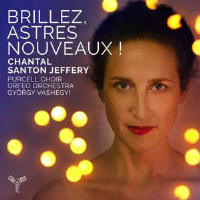Texte paru dans: / Appeared in: |
|
|
Outil de traduction (Très approximatif) |
|
|
Reviewer:
Richard Lawrence Not all the pieces are for the voice. One of the pleasures of the disc lies in noting the artful inclusion of orchestral numbers. After the first excerpt from Rameau’s Les fêtes d’Hébé comes a Ritournelle from Royer’s Le pouvoir de l’Amour, which leads seamlessly back into the Rameau. Indeed, great care has evidently been taken over the order in which the items appear. I loved the way the mournful bassoon of ‘Triste séjour’ from Rameau’s Les Paladins is followed by what sounds like three bassoons in ‘Laissons de mon amour’ from Mondonville’s Les fêtes de Paphos. And ‘Éclatante trompette’ (Les fêtes d’Hébé) is aptly preceded by ‘Courez à la victoire’ from Rameau’s Dardanus. There’s much delight to be had from the scoring: flutes in the sleep scene from Boismortier’s Les voyages de l’Amour, piccolos in Pomone, bassoons again in Dauvergne’s Canente. As in the recordings mentioned above, the Orfeo Orchestra – and the Purcell Choir, too – perform beautifully under Vashegyi. Chantal Santon Jeffery – now without the hyphen – skilfully conveys a wide range of emotions. She ends with a brisk performance of the title-number, ‘Brillez, astres nouveaux’ from Rameau’s Castor et Pollux, a good example of a cheerful piece in a minor key. The scene from Cardonne’s Omphale is particularly well done, an impassioned accompanied recitative for Argine that fades away as she sings ‘I die of love and sorrow’. And Jeffery is similarly moving in the Dauvergne opera, where Canente attempts to win over a chorus of sorcerers in the manner of Orpheus and the Furies; they submit simultaneously with her last plea, an effective touch. The booklet includes texts and translations, and an interesting background article by Benoît Dratwicki: nothing about the dramatic situations, though, and there’s a confusing reference to Mondonville’s Le carnaval du Parnasse when what is meant is his Les fêtes de Paphos. |
|




